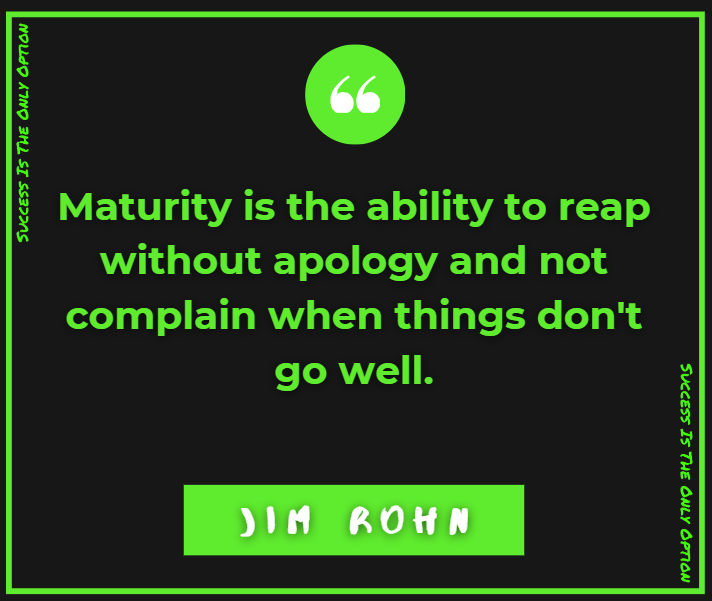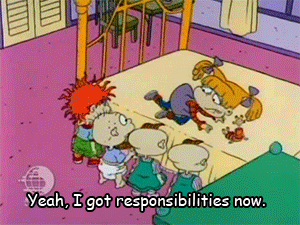How to Be More Mature And Level-Up Your Life
Are you struggling to achieve success in your personal and professional life?
Do you find yourself making the same mistakes over and over again and never seem to get anywhere?
It could be that you need to learn how to be more mature...
In a hurry? Listen on the go!
How to Be More Mature
Maturity is the ability to handle difficult situations with grace and wisdom. It's not just about age, but about how you handle responsibility, make decisions, and deal with others.
Developing maturity is crucial for success because it allows
you to navigate challenges and setbacks with confidence, learn from your
mistakes, and cultivate positive relationships.
In this article, we'll explore the habits and behaviours you can adopt to become more mature. We'll also discuss the obstacles that can hinder your maturity and how to overcome them.
By the end of this article,
you'll have actionable advice and strategies to develop your maturity and
achieve greater success in all areas of your life.
Understanding Maturity
Maturity is a complex concept that involves a combination ofemotional, social, and intellectual development. Some of the key components of
maturity include:
- Emotional Intelligence: The ability to recognize, understand, and manage your emotions and the emotions of others.
- Self-Awareness: Knowing your own strengths and weaknesses, as well as your values and beliefs.
- Responsibility: Being accountable for your actions and taking ownership of your mistakes.
- Empathy: The ability to understand and share the feelings of others.
- Growth Mindset: A positive attitude towards challenges and failures, viewing them as opportunities to learn and grow, rather than throwing a tantrum and giving up.
It's important to note that maturity is not necessarily tied to your chronological age.
Just because someone is older, doesn't necessarily
mean they are more mature. Similarly, a young person can demonstrate a high
level of maturity if they have developed the necessary skills and traits. in fact, studies have shown that peoples brains 'mature' at vastly different rates.
Understanding how to be more mature is essential for achieving success in all areas of your life.
In your personal life, it can help you build stronger
relationships, communicate more effectively, and make better decisions. In your
professional life, maturity can lead to better job performance, improved
leadership skills, and greater opportunities for advancement.
As famous author and speaker, Jim Rohn said, "Maturity is the ability to reap without apology and not complain when things don't go well." Developing maturity requires effort, but the benefits are well worth it.
In the following sections, we'll explore the habits and behaviors
that can help you cultivate greater maturity and achieve greater success, as well as other behaviours that you should avoid at all costs..
Habits to Cultivate Maturity
Let's take a look at some of the key traits of maturity, and the habits that you can start to put in place in order to develop them.
Self-Awareness
Self awareness is an important part of maturity, it's about self reflection and taking an honest account of yourself and your behaviours to find areas for improvement.
Some of the habits you can incorporate could be to:
Reflect on your strengths and weaknesses
Take time to reflect on your strengths and weaknesses. Make
a list of your strengths and use them to your advantage. On the other hand,
identify your weaknesses and work on improving them. Being aware of your
limitations and weaknesses will help you grow as a person and become more
mature.
Identify your values and beliefs
Knowing your values and beliefs can help you make better
decisions and live a more meaningful life. Take some time to think about what
you believe in and what is important to you. Write them down and use them as a
guide when making decisions.
Emotional Intelligence
When thinking about how to be more mature, emotional intelligence is a key trait that comes to mind. It is about understanding and controlling emotions - both yours and those of other people.
By being able to understand emotions, you can better evaluate situations and communicate and act appropriately, leading to better results and stronger relationships. Some of the ways you can develop this are:
Practice mindfulness
Mindfulness is the practice of being present in the moment
and fully engaged in what you're doing. It can help you become more aware of
your emotions and the emotions of others. Try practicing mindfulness meditation
for a few minutes each day.
Improve your communication skills
Effective communication is essential for developing
emotional intelligence. Practice active listening, which means fully focusing
on what the other person is saying without interrupting or judging. Pay
attention to your tone of voice and body language when communicating with
others.
Responsibility
This is a biggie, and if you have read my other posts you will see it is something that comes up over and over again, as it is something people fail at too often and resort to a victim mindset.
If you want to move your life to the next level, you HAVE to start taking responsibility for your own life. Start by:
Taking ownership of your mistakes
No one is perfect. When you make a mistake, own up to it and
take responsibility. Don't make excuses or blame others. By taking ownership of
your mistakes, you'll learn from them and become more mature.
Make a plan and follow through
Set realistic goals and make a plan to achieve them. Take
responsibility for following through on your plan. If you encounter obstacles,
don't give up. Find ways to overcome them and keep moving forward.
Develop Empathy
Empathy is a part of developing emotional intelligence, but it deserves listing by itself, since it is so important for developing strong relationships.
As humans we are social creatures and thrive off social interactions and relationships - in fact it is this ability to communicate and organise ourselves that made our species as successful as it is, so it stands to reason that if you want to find success, then you need to develop this skill. Start by:
Practice active listening
As mentioned earlier, active listening is an important
component of emotional intelligence. When you practice active listening, you'll
become more aware of the emotions of others and be able to respond with
empathy.
Put yourself in other people's shoes
Try to see things from other people's perspectives. This will help you understand their emotions and experiences. By understanding others, you'll be able to connect with them on a deeper level and build stronger relationships.
Develop a Growth Mindset
If you want to know how to be more mature, then one thing you will need to work on is your mindset. In particular, you need to work on developing a growth mindset.
Having a growth mindset means not being a victim of your circumstances. It is knowing that with directed effort, you can learn the skills, attitudes and behaviours needed to be successful by:
Embracing challenges
Don't shy away from challenges. Instead, view them as
opportunities to learn and grow. When you encounter a challenge, ask yourself
what you can learn from it.
A growth mindset is the belief that you can develop your
abilities and intelligence through hard work, dedication, and perseverance.
Mature people embrace a growth mindset and are always seeking
opportunities to learn and grow. They view challenges as opportunities forgrowth rather than obstacles to overcome.
Learning from failures
Failure is a natural part of life, there is no need to fear failure. Rather than dwelling on
your failures, use them as an opportunity to learn and grow. Ask yourself what
you can do differently next time.
As entrepreneur and author, Seth Godin said, "Maturity is the ability to do a job whether or not you are supervised, to carry money without spending it, and to bear an injustice without wanting to get even." By cultivating these habits, you can become more mature and achieve greater success in all areas of your life.
Examples of Mature Behaviours
To better understand how to be more mature, let's take
a look at some examples of mature behaviours...
Resilience
Being able to bounce back from setbacks and challenges is a
sign of maturity. Mature people don't let failure define them. They take
responsibility for their mistakes, learn from them, and keep moving forward.
Self-Control
Mature people have self-control. They don't let their
emotions dictate their actions. Instead, they take a step back, evaluate the
situation, and respond in a calm and rational manner.
Accountability
Mature people take responsibility for their actions.
They don't blame others for their mistakes or make excuses. They own up to
their mistakes and take steps to make things right.
Empathy
Mature people are empathetic. They are able to
understand and relate to the emotions of others. They treat others with kindness
and respect, even when they disagree.
Open-mindedness
Mature people are open-minded. They are willing to consider different viewpoints and ideas. They don't dismiss ideas simply because they are different from their own. Instead, they are open to learning and growing by considering alternative perspectives.
Setting and Achieving Goals
Mature people set goals for themselves and work to achieve them. They have a clear sense of direction and purpose, and they take action to achieve their objectives. They break down their goals into smaller, achievable steps, and track their progress along the way.
By setting and
achieving goals, they build confidence and a sense of accomplishment, which
further fuels their growth and development.
By modelling these behaviours, you can develop a more mature and successful mindset and learn how to be more mature. Remember, maturity is a key component of a successful mindset. It's not something that can be achieved overnight, but rather, it's a lifelong process of personal growth and development.
By cultivating the
behaviours listed above, you can become more mature and achieve greater success
in all areas of your life.
Behaviours that Hinder Maturity
It is one thing to talk about behaviours to develop, but often it is more important - and relateable, to talk about the behaviours you should avoid.
Let's take a look at it from another perspective then, with examples of behaviours to avoid if you want to know how to be more mature...
Avoiding Accountability
Avoiding accountability means shirking responsibility for your actions and their consequences. This could include not owning up to mistakes, shifting blame onto others, or failing to follow through on commitments.
By
avoiding accountability, you undermine trust and respect in your relationships
and limit your own personal growth.
Blaming Others and Making Excuses
Blaming others for your problems and mistakes is a sign of immaturity. It shows that you are unwilling to take responsibility for your actions and the consequences that follow.
Making excuses is similar to blaming
others and often involves trying to justify or rationalize your behaviour. By
shifting blame onto others or making excuses, you miss out on opportunities to
learn and grow from your mistakes.
Resisting Change and Growth
Mature people embrace change and are willing to adapt to new situations and challenges. Resisting change, on the other hand, is a sign of immaturity.
It can involve clinging to old habits, routines, or ways ofthinking, even when they are no longer effective or useful. By resisting
change, you limit your own personal growth and development.
Acting Impulsively and Without Thought
Acting impulsively without considering the consequences of your actions is another sign of immaturity. It can involve making decisions based on emotion rather than reason, or failing to consider the potential impact of your actions on yourself and others.
By acting impulsively, you may create
unnecessary problems for yourself and others, and miss out on opportunities to
make more thoughtful and beneficial decisions.
Avoiding Challenges and Taking the Easy Way Out
Mature people are willing to take on challenges and face difficult situations head-on, instead of being immature and avoiding them.
Avoiding challenges can involve seeking shortcuts or taking the easy way
out, rather than putting in the effort and hard work necessary to achieve
meaningful goals. By avoiding challenges, you limit your own personal growth
and miss out on opportunities to learn and develop new skills.
If you recognise any of these behavious in yourself, then you need to take action to correct them if you ever hope to improve your life.
Check out this video for more clues that you are not being mature...
Overcoming Challenges and Obstacles
No matter how mature you become, life will always throw you curveballs - that's just how it works. You will encounter unexpected obstacles, face setbacks, and experience failures.
Everyone faces challenges in life, it's your job to develop the 'mental tool-kit' to solve the problems that you are facing.
The key to growing in maturity is not to avoid these
challenges but to learn how to overcome them. Here are some tips to help you
persevere through tough times:
How to stay motivated and persevere through challenges
One of the biggest obstacles to overcome when facing challenges is staying motivated. It can be easy to get discouraged and lose sight of your goals. To stay motivated, it's important to have a strong sense of purpose and a clear vision of what you want to achieve.
When you have a
clear goal in mind and know your why, it's easier to stay focused and motivated, even when things
get tough.
Another key to staying motivated is to break your larger goals down into smaller, more manageable tasks. This can help you feel a sense of progress and accomplishment as you work towards your larger goal.
Celebrate
the small victories along the way, and use them as motivation to keep going.
Overcoming setbacks and failures
Setbacks and failures are inevitable, but they don't have to define you.
In fact, it is often said that one of the keys to becoming successful is to 'fail fast'. This just means getting stuck in, making mistakes and learning from them.
To overcome setbacks and failures, it's important to embrace a growth mindset. This means seeing failure not as the end of the road, but as a chance to learn and improve.
Next time something doesn't go to plan, take a step back and analyze what went wrong. What could you have done differently? What did you learn from the experience?
Use that knowledge to improve your approach going forward, then adjust and try again.
Strategies for building resilience and bouncing back stronger
Resilience is the ability to recover from adversity and come
back stronger. It's an essential skill for anyone trying to find out how to be more mature and succeed
in life. Building resilience takes time and effort, but it's a skill that can
be learned.
One way to build resilience is to develop a strong support system.
Surround yourself with positive, supportive people who encourage you to
be your best self. Lean on these people when times get tough, and allow them to
help you get back on your feet.
Another strategy for building resilience is to focus on self-care. Make sure you're taking care of your physical, emotional, and mental well-being.
This might mean getting enough sleep, eating a healthy diet,
exercising regularly, and taking time for yourself to recharge and relax.
Maturing into a more responsible and thoughtful person is a process that takes time and effort. By cultivating positive habits and behaviours and overcoming challenges and setbacks, you can continue to grow and mature throughout your life.
Remember, it's not about being perfect but about making
progress and continually striving to be your best self.
Conclusion
We have looked at how to be more mature, and hopefully you realise that you must take responsibility for your actions, communicate effectively, maintain a positive attitude, and cultivate healthy habits. Also, you should avoid behaviours that hinder your growth.
Remember, maturity is not a destination but a journey. It requires on-going self-reflection and growth.
It requires time, effort, and a willingness
to learn, adapt, and change - but the rewards of maturity are great. It can help
you achieve success in all areas of your life, including your career,
relationships, and personal development.
So, don't wait for maturity to come to you... Take action now to be more mature and find your version of success!
It's never too late to start the journey towards maturity and watch yourself grow and succeed - but it is up to you to make it happen. As Mahatma Gandhi said, "Be the change you wish to see in the world."

















Comments